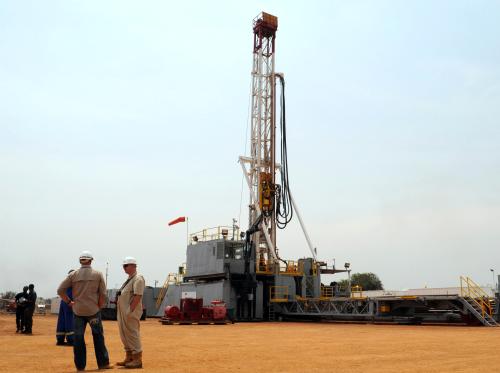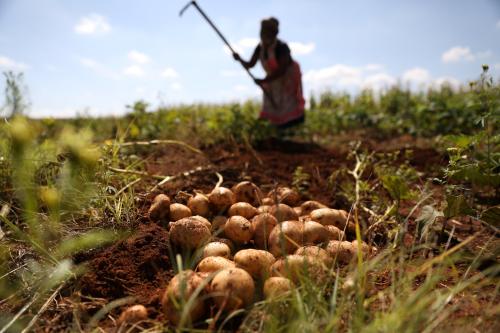Uganda-Tanzania pipeline deal draws high expections, scrutiny
On Sunday, April 11, Ugandan President Yoweri Museveni and Tanzanian President Samia Hassan Suluhu signed an agreement to contruct the East African Crude Oil Pipeline (EACOP). The $3.55 billion pipeline will stretch from Uganda’s Albertine Graben region, where commercially viable oil deposits were discovered in 2006, to the Tanzanian port of Tanga. At 1,440 km, the pipeline will be the largest heated pipeline in the world and connect two oil fields—the Kingfisher field, operated by China National Offshore Oil Corporation Ltd (CNOOC), and the Tilenga field, operated by Total S.A. Contruction is anticipated to take three years, opening up the pipeline for commercial use by 2025 at the earliest. The meeting in Entebbe also witnessed the signing among shareholders of the project, including CNOOC, Total, the Uganda National Oil Company, and the Tanzania Petroleum Development Corporation.
Hopes for job creation and long-term profits are high among many: Suluhu noted that the project is expected to create 10,000 jobs, and the World Bank estimates that, by 2030, peak oil production in the region—up to 60,000 barrels of oil per day—could earn Uganda up to $3 billion. Notably, the agreements mandate that the oil companies must award at least 30 percent of project-related contracts to local Ugandan suppliers.
The project has met resistance, though, from both the local and international community over fears of displacement of local communities, risk of environmental harm, and lack of transparency. In fact, in early March, 263 international and local civil society groups published an open letter urging banks not to finance the project. In response to environmental concerns, Total has stated that it will limit oil extraction from the national park to less than 1 percent of the protected area and fund a 50 percent increase in the number of rangers in Murchison Falls National Park, Uganda’s largest protected area.
For more on the challenges of effective natural resource management in the Albertine Graben region, see the relevant commentary from AGI’s Ugandan think tank partner the Economic Policy Research Centre.
Poor rains quell resurgence of locust swarms in East Africa
Following a devastating locust swarm that inundated East Africa with the crop-destroying insects in 2020, the United Nations’ Food and Agriculture Organization (FAO) reports that the locusts in East Africa remain immature and underdeveloped this year due to poor rains. Although the FAO identified some locust swarms in the Kenyan Rift Valley, a fertile plain that grows Kenya’s staple foods, cautious optimism persists as, without significant rain, the locusts will not breed—limiting their threat to food security and agriculture-based livelihoods. However, while poor rains might reduce the threat of destructive locusts, it may also translate into a poor harvest for a region that has suffered from perpetual drought. In response to this trade-off, though, as a Kenyan farmer stated to the Associated Press, “a poor harvest [is] better than nothing.”
Farmers and activists in the region have already been gearing up to combat the pests given their potential to cause widespread devastation. Indeed, 2020 saw one of the worst outbreaks in a century. As the locust swarms swelled last year, with billions descending on East Africa, mobile apps became a seminally important grassroots system for tracking the swarms. Now, combined with integrated military, NGO, and civilian control operations armed with insecticide, locust numbers continue to decline. However, the economic and nutritional damage of the locust swarms—an average-size individual swarm can consume enough food to feed 2,500 people in a day—impacted approximately 19 million farmers and herders in the region last year, endangering the already fragile food security situation in the Horn of Africa.
For more on the role of technology in mitigating food insecurity in Africa, read “The future of data: Unmasking community-level differences to better address food insecurity” from AGI’s Foresight Africa 2021.
Voters in Chad, Benin, and Djibouti head to the polls amid local and national tensions
On Sunday, April 11, Chad held its presidential election, which was preceded by a number of protests and arrests. As of this writing, results have yet to be released, and al-Jazeera reports that the election commission has until April 25 to announce provisional results. Incumbent President Idriss Deby, who is predicted to win, has been in power since 1996. Election day was met with some violence, as the rebel group Front for Change and Concord in Chad (FACT), a political-military group founded by dissident army officers in 2016 and based in Libya, attacked the Zouarké border post.
Sunday also saw Benin’s presidential election in which President Patrice Talon was reelected with 86.3 percent of the vote, according to the Associated Press. The results must now be validated by the Constitutional Court. The election in Benin was preceded by boycotts from opposition parties over preelection violence and objections to President Talon’s serving a second term, as he had pledged in 2016 to step down after one and subsequently passed reforms disqualifying many of the opposition from running.
Djibouti also voted last week, with incumbent President Ismaïl Omar Guelleh securing a fifth term—with 98 percent of the vote—among widespread boycotts from the opposition, according to al-Jazeera.
Also this week, Somali President Mohamed Abdullahi Mohamed signed a law to extended his term for two years despite risk of international sanctions. The decision was met with condemnation from both the United States and European Union, with U.S. Secretary of State Tony Blinken stating that the move “will compel the United States to reevaluate our bilateral relations with the Federal Government of Somalia, to include diplomatic engagement and assistance, and to consider all available tools, including sanctions and visa restrictions, to respond to efforts to undermine peace and stability.” The Somali election process has been deadlocked since last fall over the organization of the elections, as many want to move away from Somalia’s currently indirect electoral system. Other contentious issues include “the formation of the electoral commission, selection of commission members for Somaliland, and the crisis in the Somalia –Kenya border region,” in addition to accusations that President Mohamed was using the national intelligence agency to rig the voting system.








Commentary
Africa in the news: Uganda oil pipeline, (fewer) locusts in East Africa, and political updates
April 17, 2021